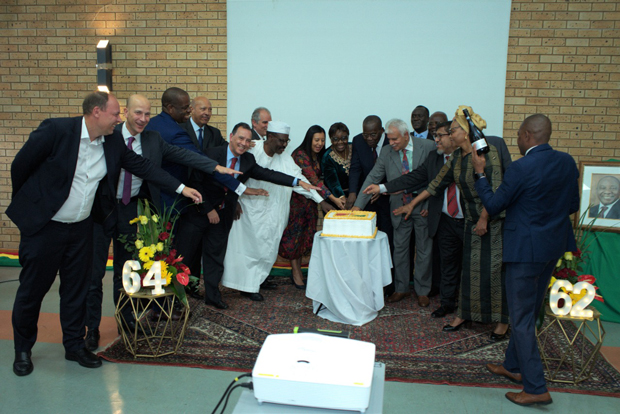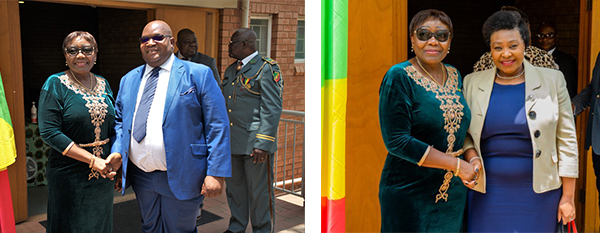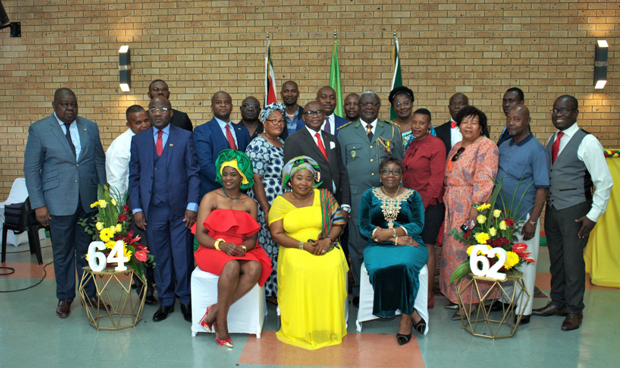Congo - Land of Opportunities
64th Anniversary of the Proclamation of the Republic of Congo and 62nd Anniversary of the Independence

1 December 2022
The Republic of Congo was proclaimed a Republic on 28 November 1958, following a decision of the territorial parliament, through a referendum held 2 months earlier, on 28 September. At a celebration of the 64th anniversary of the Proclamation of the Republic of Congo and the 62nd Anniversary of the Independence in Pretoria Ambassador of Congo Chantal Maryse Itoua-Apoyolo said, “Congo remains a nation at work, where foreign investors and partnerships are warmly welcomed.”

The Republic of Congo is located along the equator in Central Africa and is bordered in the north by Cameroon and the Central African Republic; in the west by Gabon; in the East by the Democratic Republic of Congo (DRC) and by Angola in the southwest.

Speech by Ambassador Chantal Maryse Itoua-Apoyolo
Ambassador Fadl Nacerodien, Chief-Director: North and Central Africa in DIRCO, representing the government of the Republic of South Africa;
Your Excellency M. Salih Omar Abdu, Ambassador of the Republic of Eritrea, Dean of the Diplomatic Corps;
Your Excellency M. Andre Nzapayeke, Ambassador of the Central African Republic, Dean of the African Group;
Your Excellencies, Heads of diplomatic and consular missions accredited in the Republic of South Africa;
Representatives of public and private institutions;
Fellow citizens, Distinguished guests, Ladies and Gentlemen,
Allow me first of all to thank you, on behalf of the Embassy and in my personal capacity, for honoring by your presence this joint celebration of the 64th anniversary of the Proclamation of the Republic of Congo and the 62nd Anniversary of the Independence.
The road to the national sovereignty of the Republic of Congo was pathed by various historical milestones, of which I will only share significant highlights, for the sake of time:
- Previously called the Territory of the Middle-Congo and forming part of the French Equatorial Africa, the Republic of Congo was proclaimed a Republic on 28 November 1958, following a decision of the territorial parliament, through a referendum held 2 months earlier, on 28 September.
- In order to preserve this chapter and consolidate its legacy in the collective memory, this day was established as a national celebration by His Excellency Denis Sassou-Nguesso, President of the Republic of Congo. The first celebration of this historical event being observed only in 2010, 52 years later.
It is understood that this day marks the 64th celebration of the existence of the Congo, as a Republic. On this solemn occasion, the President of the Republic Congo is currently delivering His State of the Nation address to a joint seating of the Parliament.
Two years later, the republican sovereignty will be followed by the accession to the national and international sovereignty, through the declaration of the Independence, on the 15 of August 1960, empowering the Republic of Congo from the French colony.
Today’s celebration grants me further the opportunity, as the Extraordinary and Plenipotentiary Ambassador of the Republic of Congo in the Republic of South Africa, to reflect on 2 significant aspects of our diplomacy:
The first one is the brotherly diplomatic relations between the Republic of Congo and the Republic of South Africa, with:
- The institution of diplomatic relations, between the 2 countries, on 22 March 1993;
- The opening of the Embassy of Congo in Pretoria in 1994, followed by the opening of the Embassy of South Africa in Brazzaville in 2006;
- The exchange of various delegations, official visits and high-level meetings to strengthen our cooperation.
- Both countries also share positions on matters of common interests, in multilateral discussions, at regional and global level.
The engagement of Congolese diplomacy, under the leadership of HE Denis Sassou-Nguesso, remain constant. We may remember his personal involvement in:
- The mediation on the Great Lakes Conflict;
- The peace process in the Central African Republic;
- Or his contribution in the peace process still unfolding in Libya, where he acts as the Chair of the African Union High Level Committee on Libya.
On this path to sustainable peace and socio-economic empowerment of the African Continent, the most memorable contribution remains the engagement of the Republic of Congo in the struggle for the liberation of Southern Africa, alongside other international stakeholders. A participation which reached its pinnacle with the Protocol of Brazzaville, signed on 13 February 1988 in the Capital city of the Republic of Congo.
This highly significant historical agreement consecrated the ultimate decolonization of Southern Africa, through the withdrawal of Cuban Troops from Angola, paving the way to the independence of Namibia and contributing to the liberation of Nelson Mandela and the end of the apartheid regime in South Africa.
No-one, better than the protagonists, can paint this historical fresco. A short documentary titled: The Protocol of Brazzaville on Peace in Southern Africa depicys this.
Please be reminded that Brazzaville hosted the 25th anniversary of the Protocol signing on the 11 February 2014, attended by former President Jacob Zuma and the late Winnie Madikizela Mandela.
My second reflection will focus on the cooperation between our 2 countries, Congo and South Africa, through highlights which allow us to assess our joint achievements and pave the way forward.
- The general agreement of cooperation between the Government of Congo and the Government of South Africa was signed on the 25th of November 2003, in Brazzaville;
- 24 subsequent agreements in various areas, including Farming, Culture, Defense and Economy have been signed since then;
- 2 Joint Commissions for Cooperation were convened in October 2010 and April 2014, respectively in Pretoria and Brazzaville.
- A third JCC scheduled in 2019 was postponed due to unforeseen circumstances. However, a senior officials’ meeting was held in the same year, allowing a thorough review of the cooperation by both parties.
- The outcome of this evaluation was that the level of implementation of our commitments remain unsatisfactory.
It is true that signing agreements is one thing; but implementing them is another one.
Our country, the Republic of Congo, was not spared by the latest international socioeconomic developments, amongst others:
- the covid-19 pandemic;
- the financial crisis resulting from the decline in oil prices
- and the climate challenges triggered by global warming. The latter remains a source of great concern and was at the center of the COP27, which gathered World leaders and other stakeholders in Sharm el Sheikh, Egypt, few days ago.
We choose nonetheless to consider these negative circumstances as opportunities for growth, rather than fatalities. Learning from the past, the Government of the Republic of Congo has embarked on a drive for the diversification of our economy, intended to reduce our reliance on oil revenues, knowing that we are the 6th producer of crude oil on the Continent.
In this regard, the latest National Development Plan for the years 2022 to 2026 aims at consolidating a strong, multisectoral and resilient economy, for inclusive and sustainable growth. This program is supported by 6 pillars, namely: Agriculture, Tourism, Infrastructures, ICT, Manufacturing and Special Economic Zones. The implementation of this framework is in line with the AU Agenda 2063 and the UN Agenda 2030, on Sustainable Development Goals.

Speech by Ambassador Fadl Nacerodien, Chief-Director: North and Central Africa in DIRCO
H.E Excellency, Ambassador Extraordinary of the Republic of Congo, Dr Chantal Maryse Itoua-Apoyolo and Members of the Embassy,
The Dean of the Diplomatic Community, H.E Salih Omar Abdu, and Ambassador of the Republic of Eritrea
Excellencies, Ambassadors and High Commissioners,
Members of the Diplomatic Community,
Distinguished Guests,
Ladies and Gentlemen
GOOD DAY, BONJOUR, SANIBONANI, DUMELANG!!!!
On behalf of the President of the Republic of South Africa, H.E Cyril Ramaphosa and the people of South Africa, I would like to extend our heartfelt congratulations to the Government and people of the Republic of Congo on the occasion of the celebration of a joint 64th Anniversary of the Proclamation of the Republic of Congo on 28 November 1958 and the 62nd Anniversary of the Independence of the Republic of Congo.
South Africa is grateful about the role played by President Sassou-Nguesso as a Chair of the OAU at the time of our struggle for liberation. He dedicated his tenure as the Chair to mobilise support amongst member states for the abolition of apartheid in our country.
South Africa and the Republic of Congo enjoy good relations dating back to 1993 and therefore, this year we are celebrating 29 years of friendship, which have been marked by a number of important events such as high level visits which led to signing of Agreements.

In this regard, Former Minister of Foreign Affairs, H.E Dr Nkosazana Dlamini Zuma, visited Brazzaville on an Official Visit from 24 to 25 November 2003, during which she and her counterpart, Minister Rodolphe Adada, signed a General Cooperation Agreement on 25 November 2003.
Your assumption of duties in South Africa in January 2022 enabled us to work towards strengthening and enhancing bilateral relations between the two countries, and further follow up on the Senior Officials Meeting held in Brazzaville in February 2019 whereby a number of important decisions were made. These decisions pave the way for the preparation of hosting the 3rd Session of the Joint Commission of Cooperation (JCC) to be convened in South Africa on a mutual date to be communicated through diplomatic channels.
The JCC is an important mechanism that allows us to reflect on progress made and address challenges being faced in our bilateral partnership.
Although much have been achieved, much more needs to be done to further deepen and expand our bilateral relations.
There is a commitment and readiness from both countries to take the bilateral relations to another level.
There is a need to establish modalities to concretise cooperation between the two countries to enhance and deepen the implementation of intra-African trade and cooperation and the consolidation of infrastructure development as well as peace and security.
South Africa stands ready to work with President Sassou-Nguesso and his Government in not only strengthening bilateral relations but also strengthening our partnership in dealing with regional, continental, and global issues of mutual concern.
We expressed our gratitude to President Sassou-Nguesso and the people of the Republic of Congo for the role played in seeking a lasting peace in the Libyan Arab Republic, thereby promoting peace and stability in our continent. South Africa’s continued willingness and readiness to assist in promoting peace and stability in the Libyan Arab Republic and contribute positively for the promotion of peace and stability in the African continent at large is affirmed.
No doubt, our deepest and strongest ties are not simply between our two governments, political leaders, or institutions but between our two peoples specifically women and young people, who work tirelessly to drive bilateral economic relations between the two countries. Given the fact that there are many opportunities for the South African private sector to be explored in the Republic of Congo especially in the mining, agricultural and agro-processing, tourism, and finance sectors. However, much work still needs to be done to bring some equity in our economic relationship to ensure mutualistic economic benefits.
In this regard, both Governments, ought to work tirelessly to create the necessary enabling framework as well as conducive environment for both our private sectors to unlock opportunities for trade, investment, innovation and growth.
We believe that South Africa and the Republic of Congo could work together in pursuit of sustainable peace, stability, and development on the Continent. While we desire to have peace and stability, however some of our countries are still experiencing instability and conflict.
In this regard, the African Union will need to re-double its efforts in resolving conflicts on the Continent to achieve our aspiration as a Continent free from wars and instability, we need to talk peace and promote peace for the well-being of the African continent.
Through such commitment, we believe we will assist the implementation of the African Union’s Agenda 2063 and its Action Plan, as well as the urgent need to pursue Agenda 2030 for Sustainable Development.
It is also hoped that our countries could work together in promoting multilateralism and South-South Cooperation. South Africa continues to call for the reform of the global system of governance to be more equitable and representative of all peoples of the world, in particular the UN Security Council.
Today is about celebrating our partnership and about sharing our cultures and the spirit of Ubuntu. I invite you to raise your glasses and join me in a toast for the continued solidarity between our two Presidents, our two governments and the peoples of our two countries.
I thank you.
Telephone: 012 342 5507
